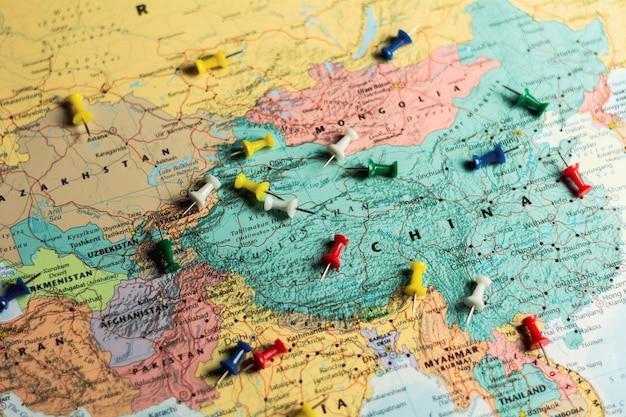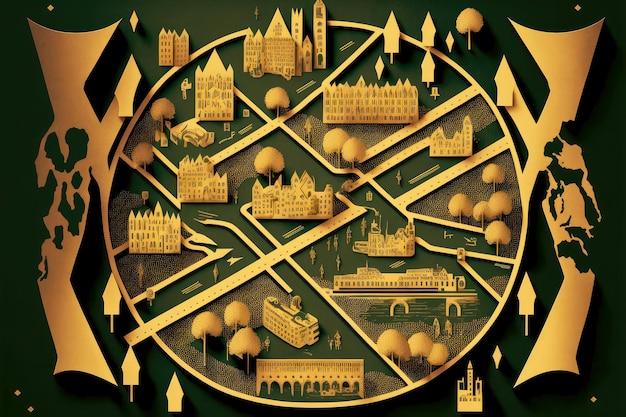Napoleon Bonaparte, a towering figure in European history, left an indelible mark on the continent both geographically and politically. From 1804 to 1814, Napoleon led France with an iron fist, reshaping borders, implementing reforms, and establishing himself as a dominant force. In this blog post, we will delve into the significant changes brought about by Napoleon across Europe during his rule.
Through an analysis of Napoleon’s goals, his relationship with the French people, and the impact of his policies, we will explore how he altered the geopolitical and political landscape of the continent. We will also examine the circumstances that eventually led to his downfall. Whether you’re a history enthusiast or simply curious about the transformative period known as the Napoleonic era, join us on this journey to discover the profound effects of Napoleon’s rule on Europe.
Stay tuned as we dive into the intriguing world of Napoleon and unravel the mysteries surrounding his influence on Europe in the early 19th century.

Napoleon’s Grand Game: A Geopolitical Revolution
The European Map Gets a Makeover!
Picture this: Europe in the early 19th century, a cluster of nations tangled in political alliances and territorial acquisitions. And then, like a strategic mastermind, enters Napoleon Bonaparte, ready to shake things up on both the geographical and political fronts. Let’s delve into how this wily Frenchman transformed the map and power dynamics of Europe in ways that astonished his contemporaries and continue to intrigue historians.
Redrawing Borders, One Conquest at a Time
Napoleon had a penchant for conquering and annexing territories, like that one friend who always adds extra toppings to their pizza. From the Iberian Peninsula to the Italian states, no land was safe from his ambition. Under his rule, the French Empire expanded its reach, leaving an indelible mark on European geography.
But it wasn’t just about adding new lands to the French Empire. Napoleon had a knack for rearranging existing borders like a real estate agent with a flair for interior design. The map of Europe went through a major facelift as he redrew boundaries, created new states, and dissolved old ones faster than a pencil-chewing cartographer could keep up.
The Birth of Modern Nation-States
As Napoleon trampled across Europe, he was not content with merely changing the physical landscape. He also left his fingerprints on the political structure of the continent. By promoting the idea of nationalism and self-determination, Napoleon inadvertently set the stage for the birth of modern nation-states.
His conquests gave rise to the idea that people with shared cultural, linguistic, and ethnic backgrounds should have their own sovereign states. This notion ignited a spark that eventually led to the formation of new nations, such as Italy and Germany, as people clamored for independence and unity. Napoleon unwittingly became the midwife of the nation-state movement, without even realizing he was changing the course of European history.
The Power Game: Shaking up the Balance
If you thought Napoleon was content with just rearranging the furniture on the map, think again. His political maneuvers had far-reaching consequences, shaking up the delicate balance of power in Europe like a game of political Jenga.
By forging alliances, neutralizing adversaries, and manipulating weaker states, Napoleon strategically positioned himself as the epicenter of European politics. He was the puppet master pulling the strings, and every monarch and statesman danced to his tune (albeit reluctantly). This newfound power dynamic not only reshaped the political landscape of Europe but also had a lasting impact on the balance of power in the centuries to come.
Conclusion: Napoleon’s Epic Legacy
It’s safe to say that Napoleon knew how to make an entrance and leave a lasting impression. Not only did he redefine the geographical boundaries of Europe, but he also played a pivotal role in shaping its political destiny. From redrawing borders to sowing the seeds of nationalism, his impact reverberated far beyond his own time.
So, the next time you’re strolling through the cobblestone streets of Paris or sipping espresso in Rome, remember that the European map you see today owes a debt of gratitude to the audacious conqueror who forever changed the course of history. Napoleon, the ultimate game-changer, turned the geopolitical chessboard of Europe into a grand arena of power, ambition, and the occasional French twist.

FAQ: How did Napoleon change Europe geographically and politically
What was Napoleon’s goal
Napoleon’s goal was to consolidate his power and establish a French empire in Europe. He aimed to spread French revolutionary ideals and consolidate his control over various nations.
Why did the French support Napoleon
The French saw Napoleon as a strong leader who brought stability to a nation ravaged by the French Revolution. His military successes and promises of glory and prosperity resonated with the people.
What rights did Napoleon take away
Napoleon curtailed many of the political and civil liberties gained during the French Revolution. He suppressed freedom of speech, limited press freedom, and tightly controlled public opinion.
What country did Napoleon rule
Napoleon ruled France and its territories, but his influence extended over much of continental Europe. At the height of his power, he controlled an empire that included major parts of Italy, Germany, Spain, and the Netherlands.
What led to Napoleon’s downfall
Several contributing factors led to Napoleon’s downfall. These include the overextension of his military campaigns, a series of costly defeats, the emergence of strong coalitions against him, and the economic strain of maintaining his empire.
What was Napoleon’s first goal
Napoleon’s first goal was to stabilize France after the turbulent years of the French Revolution. He aimed to restore order, establish a strong government, and consolidate his power.
How did Napoleon stabilize France
Napoleon stabilized France by implementing new laws, such as the Napoleonic Code, which streamlined the legal system and provided consistency. He also focused on economic development, improved education, and rebuilt infrastructure.
Did Napoleon invade England
No, Napoleon never successfully invaded England. The Battle of Trafalgar and the strong British navy prevented him from realizing this ambition.
How did the Napoleonic era change Europe
The Napoleonic era transformed Europe politically and socially. It dissolved old feudal systems, toppled monarchies, and laid the groundwork for the emergence of more modern nation-states. The concept of nationalism gained momentum, and the balance of power among European nations shifted.
How did Napoleon change Europe’s geography and politics
Napoleon’s conquests redrew the map of Europe. He annexed territories, created satellite states, and imposed his reforms and ideas across the continent. As a result, boundaries were redrawn, new nations emerged, and the influence of France expanded while weakening the power of traditional empires.
Did Napoleon help the poor
Napoleon introduced several measures aimed at improving the lives of the poor. His policies included standardized education, public works projects, and the establishment of the Bank of France to stabilize the economy and provide financial aid to struggling citizens.
What four things did Napoleon do to improve France
Napoleon implemented the Napoleonic Code to provide a unified legal framework, centralized the administration to ensure efficiency, focused on economic development to stimulate growth, and strengthened the military to reinforce France’s position on the global stage.
What changes did Napoleon make to France
Napoleon made significant changes to France’s political, legal, and social systems. He centralized power, introduced a more equitable tax system, stabilized the economy, reformed education, established the Bank of France, and codified laws through the Napoleonic Code, which formed the basis of modern French law.
What made Napoleon a great leader
Napoleon’s military genius, strategic brilliance, and charisma made him a great leader. He possessed an astute understanding of warfare, implemented effective reforms, and inspired loyalty among his troops. His legacy lies in the enduring impact of his reforms and the profound changes he brought to Europe.
